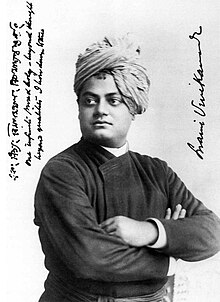 Swami Vivekananda (Bengali: [ʃami bibekanɔnd̪o] (
Swami Vivekananda (Bengali: [ʃami bibekanɔnd̪o] (
Born into an aristocratic Bengali family of Calcutta, Vivekananda was inclined towards spirituality. He was influenced by his guru, Ramakrishna, from whom he learnt that all living beings were an embodiment of the divine self; therefore, service to God could be rendered by service to mankind. After Ramakrishna's death, Vivekananda toured the Indian subcontinent extensively and acquired first-hand knowledge of the conditions prevailing in British India. He later travelled to the United States, representing India at the 1893 Parliament of the World's Religions. Vivekananda conducted hundreds of public and private lectures and classes, disseminating tenets of Hindu philosophy in the United States, England and Europe. In India, Vivekananda is regarded as a patriotic saint and his birthday is celebrated there as National Youth Day.
---------------------------------------------------------------------------------------------
There have been several meetings referred to as a Parliament of the World's Religions, the first being the World's Parliament of Religions of 1893, which was an attempt to create a global dialogue of faiths. The event was celebrated by another conference on its centenary in 1993. This led to a new series of conferences under the official title Parliament of the World's Religions.
-------------------------------------------------------------------------------------------
Vedanta (/vɪˈdɑːntə/; Sanskrit: वेदान्त, IAST, Vedānta) or Uttara Mīmāṃsā is one of the six orthodox (āstika) schools of Hindu philosophy. Vedanta literally means "end of the Vedas", reflecting ideas that emerged from the speculations and philosophies contained in the Upanishads. It does not stand for one comprehensive or unifying doctrine. Rather it is an umbrella term for many sub-traditions, ranging from dualism to non-dualism, all of which developed on the basis of a common textual connection called the Prasthanatrayi. The Prasthanatrayi is a collective term for the Principal Upanishads, the Brahma Sutras and the Bhagavad Gita.
All Vedanta schools, in their deliberations, concern themselves with the following three categories but differ in their views regarding the concept and the relations between them: Brahman – the ultimate metaphysical reality, Ātman / Jivātman – the individual soul or self, and Prakriti – the empirical world, ever-changing physical universe, body and matter.
Some of the better known sub-traditions of Vedanta include Advaita (non-dualism), Vishishtadvaita (qualified non-dualism), and Dvaita (dualism). Most other Vedantic sub-traditions are subsumed under the term Bhedabheda (difference and non-difference). Over time, Vedanta adopted ideas from other orthodox (āstika) schools like Yoga and Nyaya, and, through this syncretism, became the most prominent school of Hinduism. Many extant forms of Vaishnavism, Shaivism and Shaktism have been significantly shaped and influenced by the doctrines of different schools of Vedanta. The Vedanta school has had a historic and central influence on Hinduism.
-------------------------------------------------------------------------------------------
Yoga (/ˈjoʊɡə/;[1] Sanskrit, योगः, pronunciation) is a group of physical, mental, and spiritual practices or disciplines which originated in ancient India. There is a broad variety of yoga schools, practices, and goals[2] in Hinduism, Buddhism, and Jainism.[3][4][5] Among the most well-known types of yoga are Hatha yoga and Rāja yoga.[6]
The origins of yoga have been speculated to date back to pre-Vedic Indian traditions; it is mentioned in the Rigveda,[note 1] but most likely developed around the sixth and fifth centuries BCE,[8] in ancient India's ascetic and śramaṇa movements.[9][note 2] The chronology of earliest texts describing yoga-practices is unclear, varyingly credited to Hindu Upanishads.[10] The Yoga Sutras of Patanjali date from the first half of the 1st millennium CE,[11][12] but only gained prominence in the West in the 20th century.[13] Hatha yoga texts emerged around the 11th century with origins in tantra.[14][15]
Yoga gurus from India later introduced yoga to the West,[16] following the success of Swami Vivekananda in the late 19th and early 20th century.[16] In the 1980s, yoga became popular as a system of physical exercise across the Western world.[15] Yoga in Indian traditions, however, is more than physical exercise; it has a meditative and spiritual core.[17] One of the six major orthodox schools of Hinduism is also called Yoga, which has its own epistemology and metaphysics, and is closely related to Hindu Samkhya philosophy.[18]
Many studies have tried to determine the effectiveness of yoga as a complementary intervention for cancer, schizophrenia, asthma, and heart disease.[19][20] The results of these studies have been mixed and inconclusive.[19][20] On December 1, 2016, yoga was listed by UNESCO as an Intangible cultural heritage.[21]
No comments:
Post a Comment